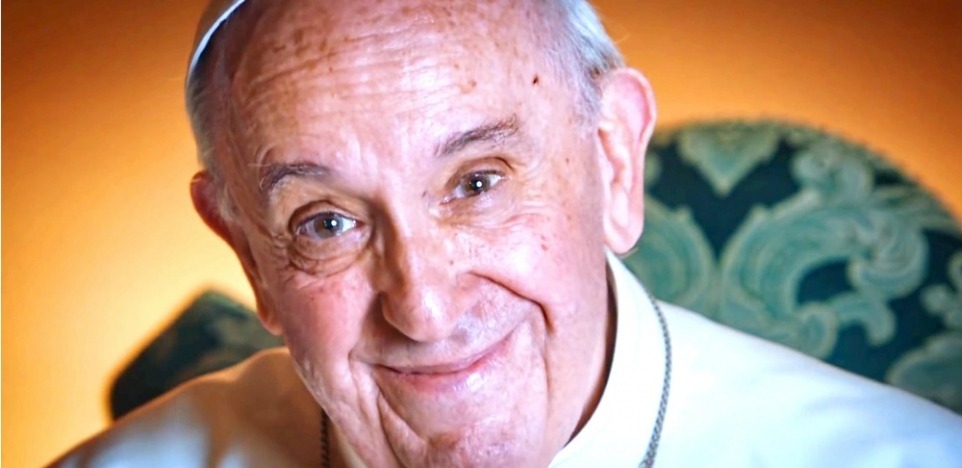On March 13, 2013, Jorge Mario Bergoglio became Pope Francis, the 266th pontiff of the Catholic Church. He was the first pope from the Americas, the first from the Southern Hemisphere, the first Jesuit, and the first to choose the name Francesco in honor of St. Francis of Assisi (1181 – 1226). He was named Person of the Year by Time magazine in 2013 and was nominated for the Nobel Peace Prize the following year.
In late 2013, German director Wim Wenders received a letter from Vatican City inviting him to make a documentary about the Pope which would be based on new interviews and the Vatican's archive of papal television footage. This unprecedented collaboration between Focus Features, the Vatican, and a group of other production companies, reveals the breadth and depth of this ardent reformer and is intended to be "a personal journey with Pope Francis rather than a biographical documentary about him."
THE DIRECTOR
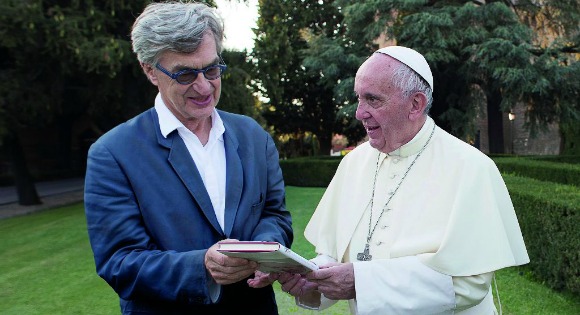
Wim Wenders has long been interested in both religious subjects and the documentary form. His classic dramas Wings of Desire and Faraway, So Close! focus on angels whose mission is to help people discover the delights of life and love. His documentaries have ranged from a portrait of the choreographer Pina to a celebration of the music of Cuba in The Buena Vista Social Club, to a monumental look at Sebastiao Salgado's photography, The Salt of the Earth. Wenders brings his own reverence for life to his work, and this quality is certainly present in his project on Pope Francis.
In his "Director's Statement" about the film, he elaborates on his perspective and intentions.
"I wanted the pope's ideas and his message to be the centre of this documentary, his work of reform, and his answers to today's global questions.
I imagined the visual and narrative concept to engage the audience face-to-face with the pope, creating a dialogue between him and, literally, the world. Taking questions from people from all walks of life, Pope Francis responds to farmers and workers, refugees, children and the elderly, prison inmates and those who live in shantytowns. All of these voices and faces are a cross-section of humanity joining in a conversation with Pope Francis.
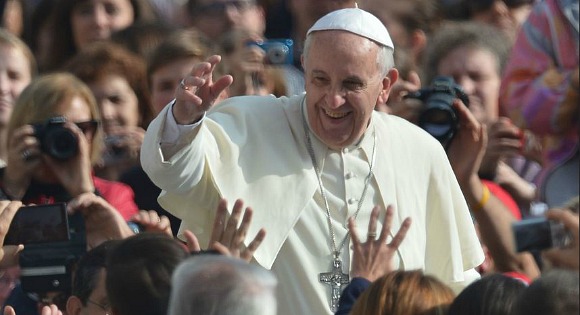
"The Vatican made it very clear to me that I'd have carte blanche and very privileged access to the archives, in addition to final cut. They let us shoot without interfering. We had four long interview sessions with Pope Francis, on four afternoons spread over two years. … We shot with several cameras, the main one with an 'Interrotron' in front of it, a sort of 'reversed teleprompter,' which allowed Pope Francis to see me on a screen and look me in the eyes while we spoke, but at the same time look straight into the lens and thereby into the eyes of everybody watching the film. In these four long talks, Pope Francis was utterly spontaneous, direct and open in all his answers.
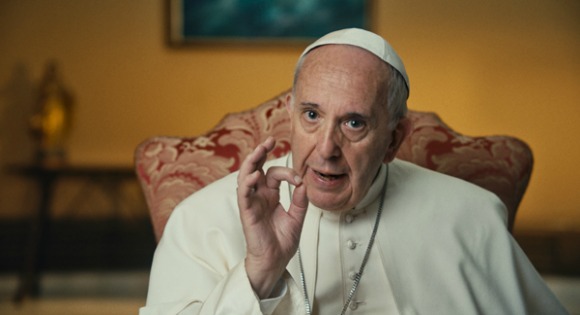
"In an era of deep distrust of politicians and people in power, when lies, corruption and fake news are the order of the day, our film shows us a man who lives what he preaches and who has gained the trust of people across the world, from all religious, cultural and social backgrounds. That's why I think this is not just a film for Catholics or Christians. Pope Francis: A Man of His Word helps to do away with certain prejudices and misunderstandings. The pope, literally, has his arms wide open for
everyone."
THE FILM
The documentary is a combination of question-asking sessions, road trips, and scenes of the pope addressing various groups. The questions cover topics like immigration, consumerism, social justice, ecological concerns, sexual abuses committed by priests, gays in the church, and more. On the road, we see him visiting poor neighborhoods, refugee and migrant camps, prisons, and historically and spiritually significant sites such as the Yad Vashem Holocaust museum and the Dome of the Rock in Jerusalem. In the closing scenes, the Pope participates in a candle-lighting ceremony where world leaders from across the globe come together in religious harmony. Everywhere, the pope reaches out to bless, embrace, and encourage the people he meets.
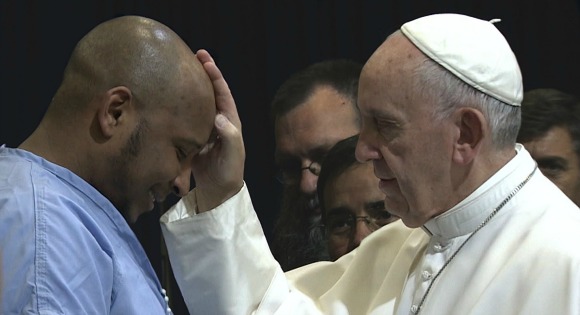
In the interviews, Pope Francis makes clear his deep love and admiration for the person and witness of St. Francis of Assisi, the thirteenth century church reformer and revolutionary. To honor this connection, Wenders created black-and-white sequences with a vintage feel to retell some of Francis' story. We understand why he is a mentor to today's Francis. The saint models devotion to God, mercy to all beings, love of the natural world, outreach to other faiths, and a positive zest for life.
Following are some of the lessons we took from this inspiring documentary.
POPE FRANCIS' SPIRITUAL TEACHINGS
1. Practice Simplicity
Early in the documentary, a young girl asks Pope Francis about his decision to live in a two-bedroom apartment rather than the affluent accommodations of the Apostolic Palace. He clearly has a penchant for simplicity, which appeals to the children in the audience.
2. Become a Little Bit Poorer
Saint Francis emphasized poverty as a way of life for himself and his monks. Many Catholic theologians have taught about God's preference for the poor. Pope Francis notes that around 80% of the world's riches are in the hands of less than 20% of the world's seven billion people. He considers this an outrage. He suggests: "We must all consider if we can't become a little poorer. This is something we can all do."
3. Do Not Put Your Hope in Wealth
Pope Francis parts company with those Christians who believe that prosperity is the reward for faith in God. "No one can serve two masters," he says. "We either serve God or we serve money." His views also are very different from many of his predecessors who would be appalled at his view that "As long as the church places its hope on wealth, Jesus is not there." Later, speaking to grassroots organizers, he declares, "We want change in our lives, in our neighborhoods, in our paychecks, in our everyday reality. We say NO! to an economy of exclusion and inequality where money rules instead of serving."
4. Be Aware that Lack of Work Robs Us of Dignity
Speaking to a working class audience in Brazil, Pope Francis holds up work as a noble thing that enables us to imitate God with our hands by creating. When this is taken away from us, it is an assault on our humanity and "the tragedy of our time."
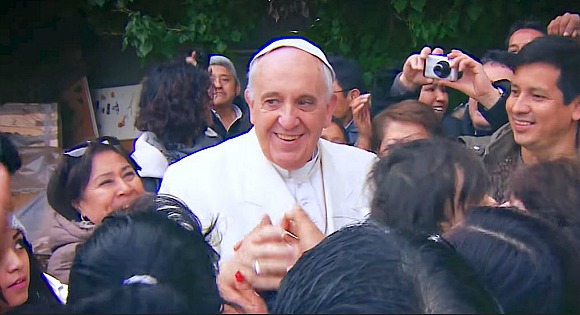
5. Protect the Planet
Pope Francis states: "If you ask me who is the poorest of the poorest of the poor, I would say Mother Earth. We have plundered her. We have abused her." His encyclical on the environment, Ladato Si, laid out the need for and ways to care for the Earth. Giving all of our energy, allegiance and money to progress, productivity, and profits of corporations is a wayward and destructive path. At the United Nations, the Pope laments the growing "culture of waste." Far better is "to live in harmony with the entire creation."
6. Let the Seed of Francis of Assisi Grow in Your Heart
Pope Francis praises his namesake for "a revitalization of the figure of Christ in a completely radical, absolute way" — his love and care for the poor and the sick, his patience with human frailty, his ability to transform others. He calls Francis of Assisi as "an apostle of the ear" who taught others to listen intently to others and then to turn the conversation to dialogue.
7. Wash the Feet of Others
Some of the most moving moments in the documentary involve Pope Francis engaged in the foot-washing ritual. He does this at a migrant detention center in Naples and at a correctional facility in Philadelphia. He tells the prisoners, "Your weariness and your wounds are also the wounds of an entire society." He displays, as Jesus did, his reverence for human beings expressed in both mercy and tenderness.
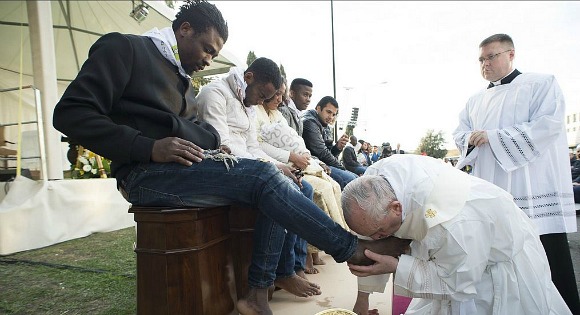
8. Slow Down and Honor the Sabbath
By putting our vulnerable minds, bodies and souls in sync with the acceleration of modern life, we have too little time for the silence, solace, and beauty of the Sabbath. "We are not machines," says Pope Francis.
One day a week, rest."
9. Make Peace in the Family
Pope Francis speaks often in the film about the importance of family love. Love is the force that heals, repairs, and redeems in the home. Never let the day end without making peace.
10. Respect Women
Pope Francis acknowledges that women have a different way of looking at things than men, and it is "extraordinarily rich!" He wants to see more reciprocity between men and women. "We have to integrate women because a world without the leadership, advice, and vision of women cannot advance."
11. Keep Building Bridges
Pope Francis is upset with the growth of gated communities where people live apart from others, thinking themselves superior. We must build bridges and respect differences as challenges which draw out the best in us. Asked about gays in the church, he says that if someone is seeking God and has good will, who is he to judge him: "We must be brothers to each other."
12. If We Want Security, Let Us Give Security
Speaking before the U.S. Congress about the refugee crisis, Pope Francis urges people to see the thousands trying to find a better life as persons and to listen to their stories. He tells the assembled politicians to remember the Golden Rule and "Do unto others as you would have them do unto you. "If we want life, let us give life. If we want opportunities, let us provide these opportunities."
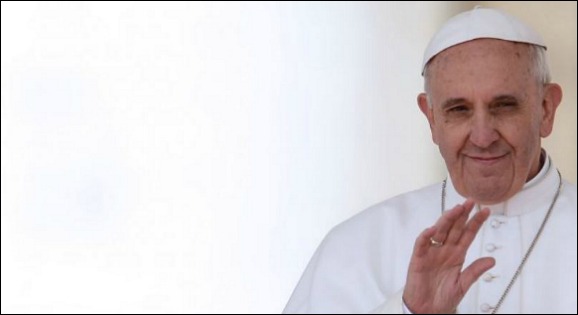
13. Stop the Arms Trade
In his speech to Congress the Pope also questions why deadly weapons are sold to people who plan to inflict suffering on others. A true peacemaker, he calls for an end to the arms trade which makes "money drenched in blood."
14. Accept Muslims as Your Brothers and Sisters
In one of the black-and-white sequences, we learn how Saint Francis traveled to Egypt during the Crusades to dialogue with the Sultan. In visits to Ground Zero and the Holy Land, Pope Francis continues this mission. "There are people who say that the God of Muslims is not the same as ours. We are children of Abraham! Nobody can deny that! Therefore we are brothers, if we like it or not. We are brothers!"
15. See with Your Heart
God sees with his heart, not his eyes, and we are called to do the same. "God's love," says the Pope, "is the same for each and every person. No matter what your religion, even for an atheist, it's the same love."
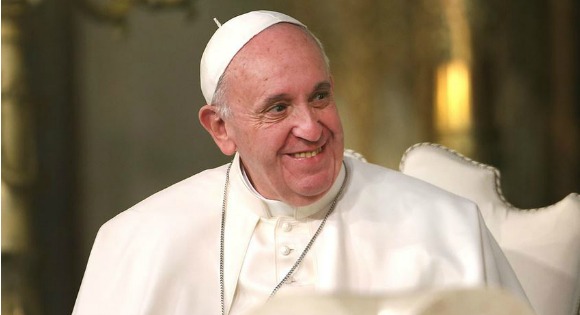
16. Build a Future without Excluding
Pope Francis challenges us to overcome "the culture of waste" where we throw away not only junk but the poor, the sick, the lost, and the lonely. He calls for "education in fraternity towards a real solidarity."
17. Be Tender
Pope Francis is sure that if we try a little tenderness every day, the world will slowly become as one. "Tenderness is not weakness. It is strength! Tenderness makes us use our eyes to see the other, our ears to hear the other, to listen to the cries of the children, the poor, those who are afraid of the future. To also listen to the silent cry of our common home, our sick and polluted Earth." This is something we can all do together.
18. Have Hope, Express Beauty, Smile, and Have a Sense of Humor
In the final close-up interview, Pope Francis summarizes what he believes will help us move into the future, despite the fears, dreads, and disappointments all around us. With a twinkle in his eyes, he admits that every day after his morning prayers, he recites Saint Thomas More's "Prayer for Good Humor." Here's how it goes:
"Grant me, O Lord, good digestion, and also something to digest.
Grant me a healthy body, and the necessary good humor to maintain it.
Grant me a simple soul that knows to treasure all that is good
and that doesn’t frighten easily at the sight of evil,
but rather finds the means to put things back in their place.
Give me a soul that knows not boredom, grumblings, sighs and laments,
nor excess of stress, because of that obstructing thing called “I.”
Grant me, O Lord, a sense of good humor.
Allow me the grace to be able to take a joke to discover in life a bit of joy,
and to be able to share it with others."
